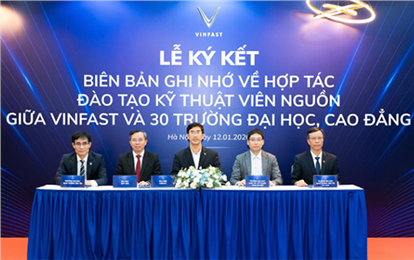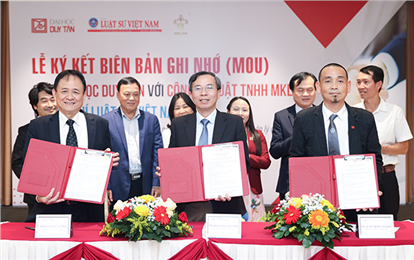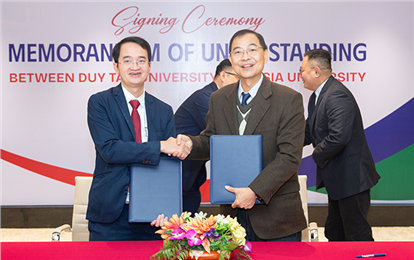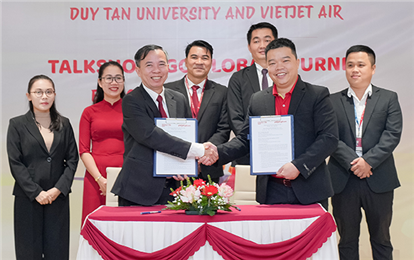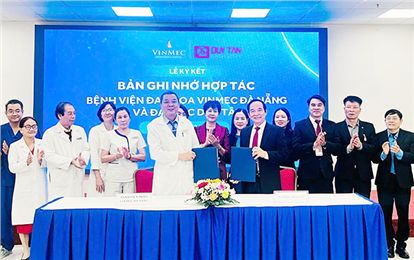Collaboration
“The ASEAN Community after 2015: Opportunities and Challenges” Seminar at DTU
The three pillars of ASEAN are taking shape, and breakthroughs in the economic, cultural, political, and social development of the 10 ASEAN countries will unify them and improve living standards. Very soon ASEAN will encounter a myriad of new opportunities and challenges, giving the P2A member universities a chance the jointly assess the new situation and exchange ideas. On May 15th, DTU partnered with the Institute for Southeast Asian Studies and the Association of Universities and Colleges of the ASEAN (P2A) to organize an international seminar entitled: “The ASEAN Community after 2015 - Opportunities and Challenges” to draw up an educational blueprint for ASEAN.

Distinguished Teacher Le Cong Co addresses the seminar
Opening the seminar, Distinguished Teacher Le Cong Co, DTU President and Provost, said: "Yesterday we dedicated an entire day to the 4th Partner Meeting of the Association of Universities and Colleges of ASEAN for academics from the Southeast Asia region. This seminar is really necessary because the world is developing rapidly, with many changes happening these days. Many new disturbances are occurring worldwide, so we have to assess the current position of ASEAN in all this, so that we can decide the most appropriate steps to develop our member countries. Education plays a major role in that development, and the quest for knowledge deserves special mention. Abundant now, our natural resources will soon be used up, but the search for knowledge is unending, only limited by distance, borders, and lack of awareness. That is why we have to organize more practical workshops, like today’s, where universities and colleges come together to draw up plans for a sustainable and developed ASEAN.”

The Seminar Chairmen
Associate Professor Nguyen Duy Dung, Director of the Institute for Southeast Asian Studies at the Vietnam Academy of Social Sciences, expressed his enthusiasm and expectations for this currently much-needed and important seminar. He said: “The Institute for Southeast Asian Studies is honored to have this opportunity to collaborate with DTU, a prestigious Vietnamese educational institution, to organize this international seminar. It is really an auspicious moment in the realization of our research aspirations with DTU and Distinguished Teacher Le Cong Co. He is always passionate and enthusiastic, with many innovative ideas for educational and research projects. This seminar is part of a long-term collaboration between our Institute and DTU. We have received many articles from national and international academics, research institutes, and universities. The diversity of ideas, the richness of the content, and the presence of the scholars today are testimony to the sentiments and the contributions to this much-needed workshop, which has aroused the interest of national and international scholars alike. Their frank opinions in the spirit of science, as well as their academic and practical suggestions will be invaluable contributions to the development of the ASEAN Community after 2015.”

Associate Professor Dung, Director of the Institute for Southeast Asian Studies
After the opening, two lively plenary sessions took place, with intense discussions and suggestions by the scholars. Over 110 research papers from 26 Vietnamese and foreign institutes and universities were submitted, and the organizers chose 50 of the best ones as abstracts and reports of the seminar. The scholars freely shared many differing viewpoints about the economy, our cultures, society, and history.
Several of the reports were praised for their extensive research and broad opinions of ASEAN. These included “A Discussion of the Outlook of the ASEAN Economic Community after 2015 and Issues”, by Dr. Nguyen Huy Hoang, Vice-Director of the Institute for Southeast Asian Studies, “The ASEAN Economic Community: Just a beginning” by Dr. Werner R. Murhadi of the University of Surabaya, in Indonesia, “The Prospects for the ASEAN Community in the Next Decade” by Associate Professor Hoang Khac Nam of the Faculty of International Studies at the University of Social Sciences and Humanities at VNU in Hanoi, and “The Opportunities and Challenges for Vietnam When the ASEAN Community is Born at the End of 2015” by Associate Professor Nguyen Cong Khanh, ex-Dean of the Faculty of History at Vinh University.

Local and foreign scholars, faculty and students at the Seminar
Many delegates spend their time researching the key ASEAN educational issues. For example, Associate Professor Trinh Thi Dinh of the Hue University of Sciences gave a presentation on: “The problems involved in preparing university graduates for the workforce in the ASEAN Community”, which asserted, “If skilled workers in the ASEAN Community freely circulate, work, settle, and considered to be equal in all of the member states, then the competitive pressure on local workers will be huge. In the ASEAN job market, qualifications, professional skills, work discipline, and foreign language skills are all key factors giving a competitive edge to workers. If we do not all understand these professional requirements, students in Vietnam and elsewhere will be unable to win, even on their home-ground.” Another viewpoint was presented by Dr. Tran Xuan Hiep, Dean of the DTU Faculty of Social Sciences and Humanities, with the topic “Building an ASEAN Identity: The Process and Initial Results”.
He stressed the importance of building an ASEAN identity as a foundation for all countries to join hands to promote and preserve the region’s cultural heritage and promote innovation and an industrial culture that will allow workers to exchange ideas and improve their mutual understanding. In addition to finding ways of collaborating culturally, it is also necessary to teach students of all levels in all countries, to help unify the diverse education systems.
Associate Professor Hoang Van Hien, Provost of the Hue University of Sciences, said: “After the thorough preparation and execution of this seminar, we have achieved our objectives. We have covered three big topics: the current status and challenges in the formation of the ASEAN Community, the perspectives of ASEAN, and, in Vietnam, the integration of culture and the training requirements of university graduates. Our sincere discussions on many vital issues will encourage us to work together to overcome our difficulties to realize the three pillars of ASEAN. The new research papers presented at the seminar will be refined and sent as suggestions to the ASEAN Secretariat and to the appropriate officials in Vietnam and in the other ASEAN countries. I hope there will be many more seminars like this one at DTU, allowing researchers to debate and contribute to the future development of the ASEAN vision.”
(Media Center)
Other News



